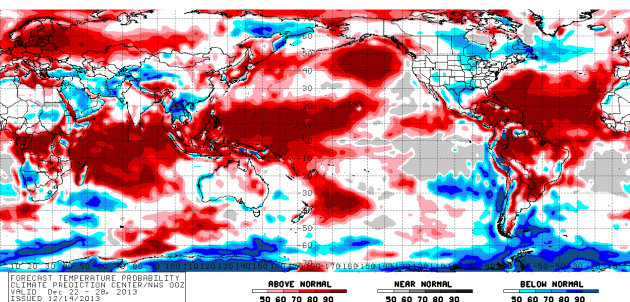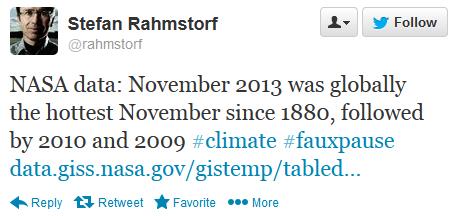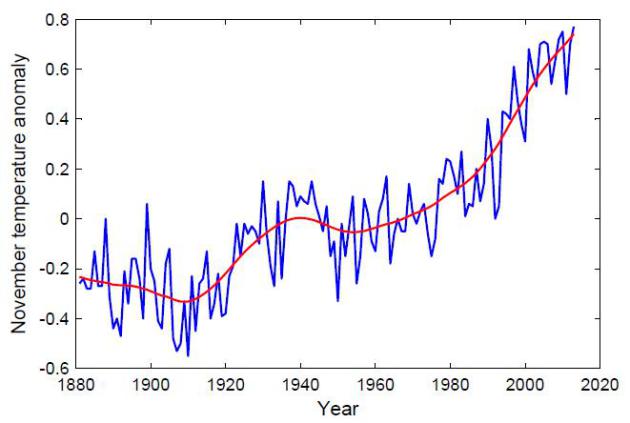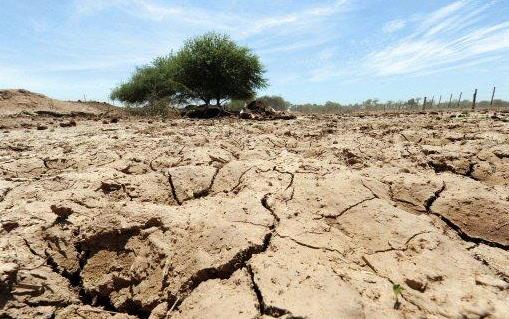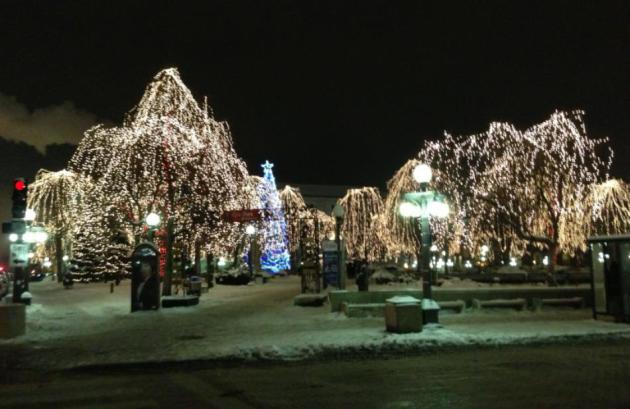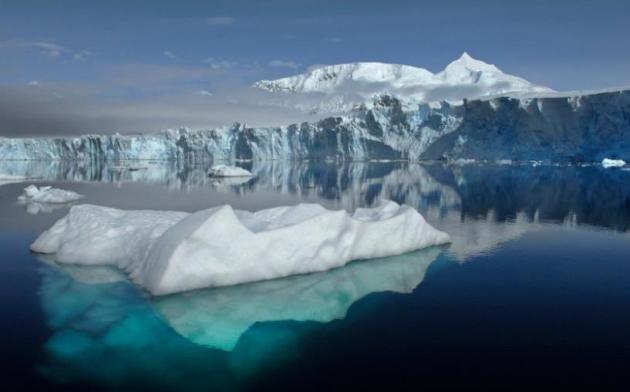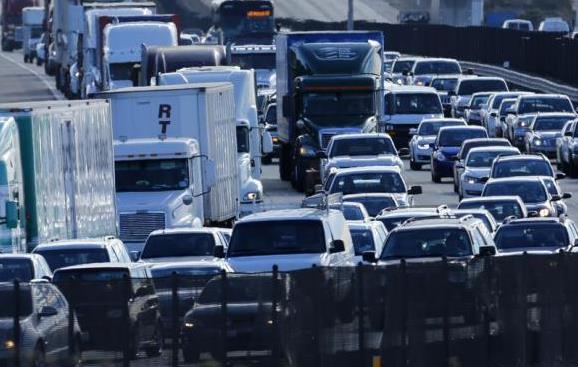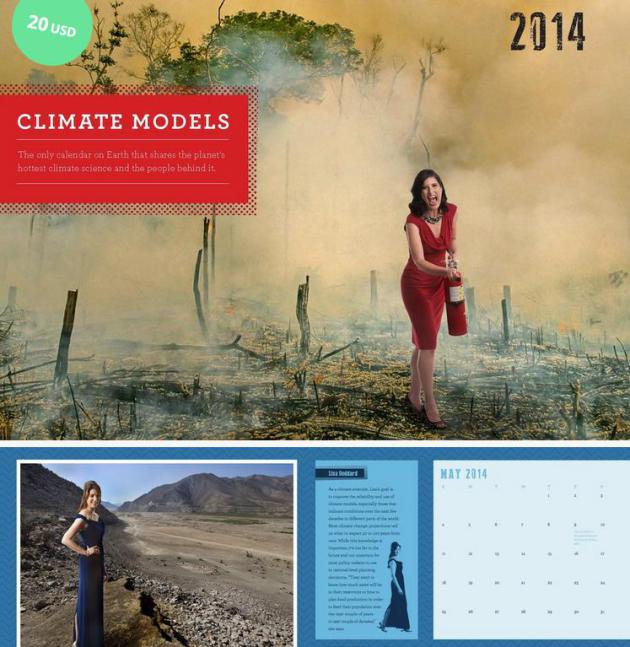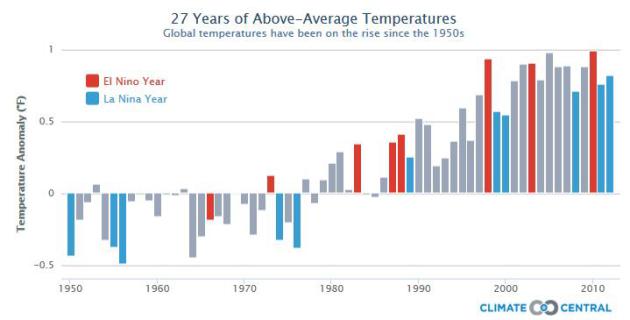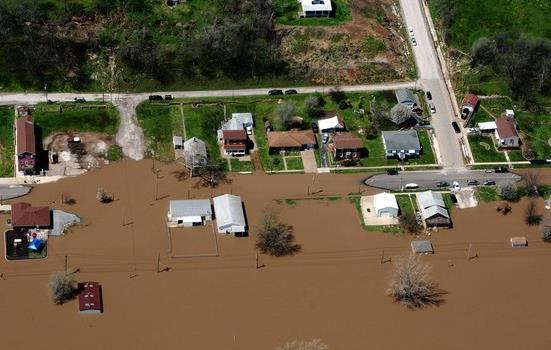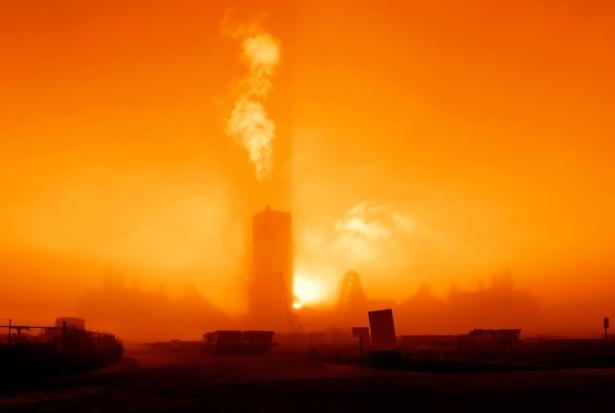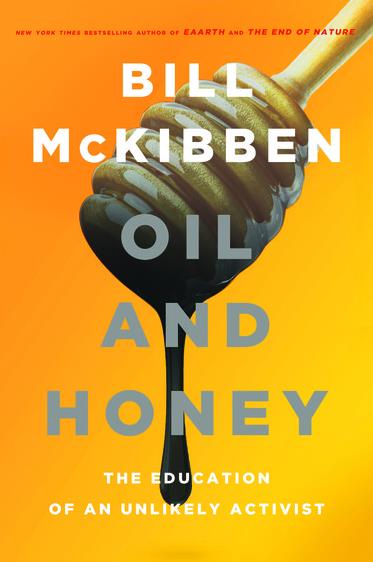The Big Picture
"All
weather, like politics, is local". It's human nature to stare out the
window and assume it's like this everywhere. TV meteorologists usually
fixate on a single city or state; it's challenging to keep a global
perspective. Climate scientists and NASA confirm that November 2013 was
the warmest November, globally, since 1880, followed by 2010 and 2009.
It's been cold in Minnesota, no debate, but much of the planet is still
skewing (much) warmer than average. Details below.
Canada
sneezes another brisk airmass south of the border today, but
temperatures moderate this week. You'll be amazed, even a little
appalled, how good 20s and low 30s feel after a spell of polar pain.
NOAA's
45-day CFS (Climate Forecast System) model shows 6 inches of snow on
the ground Christmas Day; a mild bias in the days leading up to
Christmas, and a mild start to January, too.
A family of Alberta
Clippers whip up a few dribs & drabs of snow, but we'll need to see a
major shift in the pattern to get a big snowstorm, one capable of
pulling Gulf moisture into Minnesota.
MSP has picked up about 10 inches of snow this winter; 5 inches below average. Better than most recent Decembers, though.
* NAEFS forecast temperature probabilities for December 22-28 courtesy of NOAA.
Record November Warmth Worldwide. Much of the USA was colder than average last month, but worldwide it was the warmest November ever observed, according to
NASA GISS.
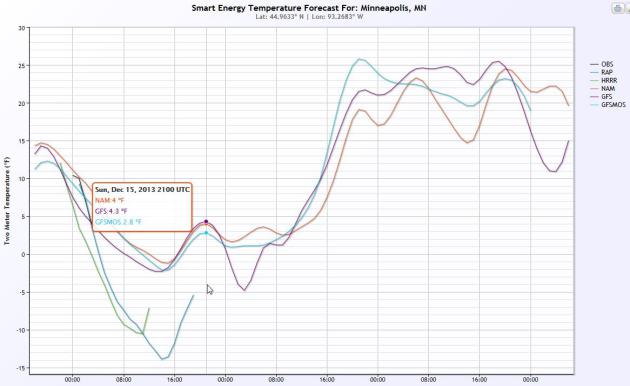 Single Digit Sunday
Single Digit Sunday.
In spite of intervals of sun highs remain in single digits today,
dipping just below zero tonight. 20s are likely as early as Monday and
Tuesday, even a shot at freezing by midweek. Temperature plot: Smart
Energy.
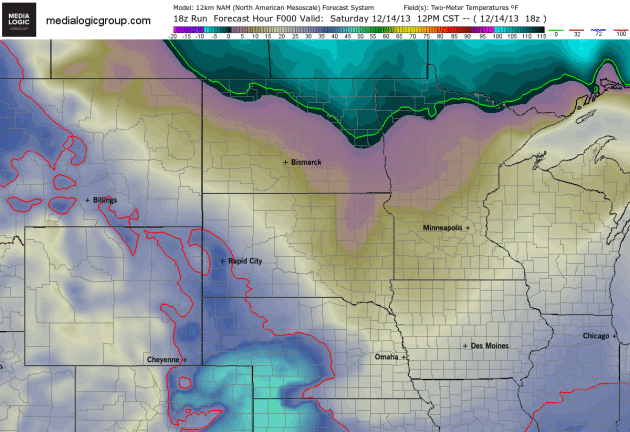 Finally - Signs Of Moderation
Finally - Signs Of Moderation.
The 2-meter temperature plot, courtesy of NOAA's 12km NAM model, shows
temperatures dipping below zero tonight, again Sunday night, before an
upward blip in the mercury by Monday and Tuesday. 84 hour temperature
animation: Ham Weather.
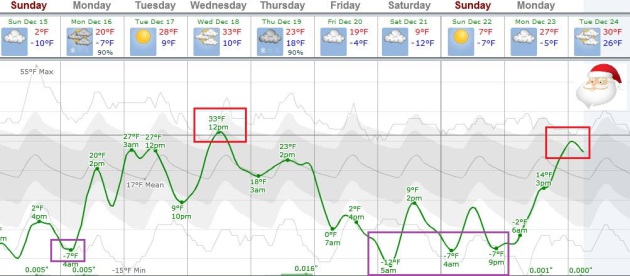 An Arctic Reprieve
An Arctic Reprieve.
ECMWF model guidance shows temperatures above average by Tuesday and
Wednesday, another surge of Canadian air Friday into the weekend giving
way to more moderation in time for Christmas Eve. Graphic: Weatherspark.
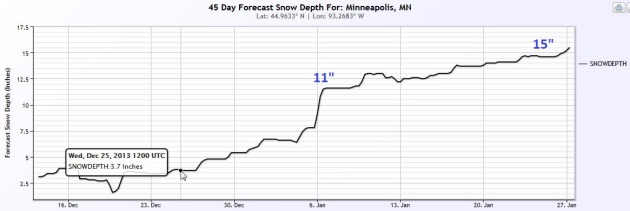 A White Christmas
A White Christmas.
NOAA's 45-day CFS (Climate Forecast System) model shows about 4" of
snow on the ground at MSP on Christmas Day, more significant snow
arriving the first week of January, as much as 15" on the ground by late
January. Potentially great news for Minnesota snow lovers, but I'm
still a bit skeptical. We'll see, but in the spirit of full disclosure
here you go.
 Temperature Roller Coaster
Temperature Roller Coaster.
I'm not bold or stupid enough to imply that the coldest weather of
winter is behind us. Odds are we'll encounter more episodes of
character-testing cold in January, but NOAA CFS guidance shows a few
warming trends to go with the cold spells into late January. Graphic:
Ham Weather.
Holy Land Blanketed In Snow After Intense Winter Storm. Here's an excerpt of a story and photo essay from Reuters and
NBC News: "
A
snowstorm of rare intensity has blanketed the Jerusalem area and parts
of the occupied West Bank, choking off the city and stranding hundreds
in vehicles on impassable roads. Israeli authorities said at least 20
inches of snow had fallen since Thursday and more was forecast. "In my
54 years I don't remember a sight like this, such an amount I cannot
recall," said Nir Barkat, mayor of Jerusalem. The Israeli military
helped police rescue hundreds of people stranded in vehicles on highways
near the city..."
Photo credit above: Dusan Vranic / AP. "
The
Western Wall and the Dome of the Rock are covered in snow in Jerusalem
on Dec. 13, 2013. Early snow has surprised many Israelis and
Palestinians as a blustery storm, dubbed Alexa, brought gusty winds,
torrential rains and heavy snowfall to parts of the Middle East."
Drought Decimates Crops In Latin America, Pushing Up Prices Of Corn And Soy. Here's a clip from
International Business Times: "...
As
a consequence of drought, 2 billion people in the world have suffered,
while 11 million have died. Last year the U.S. experienced its worst
drought in half a century, and drought was also felt in South America:
Argentina and Brazil’s soy and corn plantations were decimated, limiting
the supply that usually meets half the world’s demand for both
products. Recent droughts have caused food prices to spike. Corn prices
grew 50 percent in 2012, and soybeans rose 25 percent, according to the
World Bank. And it's just the beginning: According to the U.N., droughts
have doubled since the 1980s. The “hydrologic cycle,” the concept that
usually describes the movement of water on Earth, has been debunked by
experts as illogical and unreliable..."
Photo credit above: "
Drought has decimated plantations in Latin America." Creative Commons.
Tesla Motors Plans To Debut Cheaper Car In 2015. Here's an excerpt from
The Los Angeles Times: "
Tesla
Motors plans to unveil an electric car in early 2015 that could sell in
the $40,000 range, a mainstream offering that could be key to the
automaker's future growth. Tesla's only current offering is the Model S,
a premium sport sedan that starts at $71,070 before any state or
federal tax incentives, and can cost far more with options. In late
2014, the Palo Alto automaker plans to release a long-awaited Model X
sport-utility, likely to sell in the same price range. The third,
lower-priced model could make its official debut at the 2015 North
American International Auto Show in Detroit, Tesla confirmed Friday. It
would begin selling in 2016 or 2017..."
Photo credit above: "
Tesla
Motors Inc.'s Model X vehicle when it was unveiled at Tesla's design
studio in Hawthorne in February 2012. Production is expected to begin
next year. In early 2015, the company plans to introduce its next model,
a high-volume car starting around $40,000."
(Tim Rue / Bloomberg).

An Introvert's Guide To Better Presentations. As someone who gives scores of presentations every year I found this article from
medium.com interesting and timely. Yes, there is a correct way to leverage Powerpoint. Less is more. Here's an excerpt: "...
There
are good biological reasons why no one likes public speaking. Knowing
this changed the game for me personally and maybe it will for you too.
Think about this: is having 30 or 300 or 3,000 pairs of eyes staring at
you from the darkness while you stand alone on stage good for you? Deep
down, you know it’s bad right? Did you ever stop to think why that is? I
have heard this hypothesis from lots of people but in the normal course
of human existence, any more than 5 or 6 pairs of eyes on you means
trouble. If there are 300 pairs of eyes looking at you, you are about to
be ambushed — you are someone’s dinner. That is why your palms get
sweaty thinking about a stage and where butterflies in your stomach come
from and once I realized that, I started to become ok with this..."

Have You Tried The New Apple II? This is funny, a stroll down memory lane. "18 Vintage Tech Ads Prove How Far We've Come", courtesy of
Huffington Post.
Curious Bunny. Photo courtesy of the mayor of Duluth, Don Ness.
Climate Stories...
The End Of The Arctic? Ocean Could Be Ice-Free By 2015.
Most climate scientists are projecting a largely ice-free arctic by
2020 to 2030, but could that day arrive sooner? Here's a clip from a
story at
The Daily Beast:
"...The entire planet is getting hotter, but the top of the world is
warming twice as fast as the global average. One leading expert, Peter
Wadhams, a professor of ocean physics at the University of Cambridge,
says the Arctic Ocean could be completely free of ice in summer as soon
as 2015. An overheated Arctic in turn threatens catastrophic knock-on
effects for the rest of the globe, including more extreme weather;
faster sea level rise; and a higher chance of accelerating global
warming to where it becomes unstoppable—what scientists refer to as
“runaway” global warming..." (Photo: NASA/Reuters).
 Climate Change Will Pose Rising Burden On U.S. Taxpayer.
Climate Change Will Pose Rising Burden On U.S. Taxpayer. Here's an excerpt from
Kitsap Sun: "
Such losses, says Ceres,
a U.S.-based non-profit organization which promotes environmentally
sustainable business practices, are set to rise considerably in the
years ahead as a result of climate change, imposing an ever bigger
burden on the U.S. taxpayer. Federal and state disaster relief payouts
last year alone are estimated to have cost every person in the U.S. more
than $300. Yet according to a new report by Ceres, Inaction on climate change: the cost to taxpayers,
the U.S. administration, its agencies and state bodies are still not
facing up to the grave financial implications of a warming world..."
U.S. 2012 Model Vehicles Hit Record Fuel Efficiency: EPA. Reuters has the story - here's the introduction: "
The average fuel economy
of vehicles sold in the United States hit a record high 23.6 miles per
gallon (mpg) for the model year 2012, the U.S. Environmental Protection
Agency said on Thursday.
Projections for the model 2013 year indicate a rise of 0.4 mpg, the EPA
said, though the agency added that it did not yet have final data for
2013. The 23.6-mpg reading for
2012 was a 1.2 mpg increase over the previous year and the second
largest increase in the last 30 years, the EPA said..."
Photo credit above: "Automobile
traffic backs-up as it travels north from San Diego to Los Angeles
along Interstate Highway 5 in California December 10, 2013." Credit:
Reuters/Mike Blake.
2014 Climate Models Wall Calendar. Yes, an entirely different sort of "climate model", and wouldn't this look good under the Christmas Tree.
Details here: "
In collaboration with photographers Charlie Naebeck and Jordan Matter,
of the New York Times bestseller "Dancers Among Us," we've created a
2014 wall calendar that features 13 portraits of climate scientists and
their research. From studies of drought in the American Southwest to reconstructions of Southeast Asia's climate history using
data obtained from tree rings, the information in the calendar covers a
broad range of current climate science and describes what scientists
are discovering about Earth's past, present and future climate..."
November Was Cold, But The Climate Keeps Warming.
It's hard-wired into our cave-man DNA to look out the window and assume
it's this way (everywhere). Winter has come on suddenly, and hard, but
that doesn't mean the rest of the planet is experiencing what we are, as
described in this article at
Time Magazine; here's a clip: "
Global warming
is a misnomer. “Warming” makes it sound as if the climate will get
hotter at a steady, predictable pace—like a pot of soup heating on the
stove. But that’s not how our enormously complex climate system works.
The increasing concentration of carbon dioxide and other warming gases
in the atmosphere is just one of many factors affecting the global
climate—including the natural year-to-year variability that has always
been at work. Over the short term, temperatures can rise and fall like
the fluctuating value of a single company in the stock market. But the
long-term trends—the important trends—remain unchanged. Case in point:
the National Climatic Data Center revealed yesterday that the average
temperature in the contiguous U.S. in November was 41.6 F—0.3 F below
the 20th century average..."
Sea Level And Risk Of Flooding Rising Rapidly in Mid-Atlantic. Climate Central has the story - here's the intro from meteorologist Andrew Freedman: "
During
the 20th century, sea levels along the highly populated U.S.
Mid-Atlantic coastline between New York and Virginia rose faster than
in any other century during the past 4,300 years, according to a new study. And as those sea levels continue to increase as a result of global warming and local land elevation changes, the risks of coastal flooding will dramatically escalate. The study, by geoscientists at Rutgers and Tufts Universities and published in the new journal “Earth’s Future,”
took a comprehensive look at the history of sea level in the
Mid-Atlantic, combining sediment records of prehistoric sea level with
modern data, which includes readings from tide gauges and satellite
instruments. The result is one of the most in-depth examinations of
past, present, and future sea level rise of any region in the U.S..." (Photo credit: AP).
What Cities Can Do To Prepare Themselves For Increasingly Severe Weather. Here's a clip from a story focused on urban resiliency, from
Huffington Post: "...
Cities
across America have good reason to expect that increasingly severe
weather events could bring devastation. Today, a 100-year flood is no
longer a once-in-a-lifetime event. Cities such as New Orleans,
Milwaukee, and Hoboken deal with regular flooding issues. In Miami Beach
and Norfolk, ocean-side streets flood with seawater simply when a high
tide comes in. And in many cities, a mild thunder storm is enough to
overflow sewers and release sewage into fresh water supplies. In these
communities, local leaders are searching for practical, cost-effective
solutions to manage floods, storm water runoff, erosion, and other
negative environmental impacts from storms. Forward-looking cities that
want to better prepare for future severe weather events can take
proactive steps to mitigate the damage of future storms..." (Image: Red Orbit).
Is Global Warming Stoking An Arctic Cold War?
As polar ice continues to melt, opening up new sea routes and
opportunities for oil and gas exploration (ironic, huh?) expect to see
the arctic emerge as a geopolitical prize, with strategic (and military)
implications.
Grist has the story - here's an excerpt: "
Militarization
and geopolitical maneuvering is heating up in the Arctic as once-frozen
tundras melt into the sea, unearthing a bonanza of oil fields and
shipping routes. Russian Pres. Vladimir Putin this week ordered his military brass
to pay “particular attention to the deployment of infrastructure and
military units in the Arctic.” He said Russia would open two new Arctic
airbases and noted that a long-deserted Russian airbase on the
Novosibirsk Islands was recently reopened..."
Photo credit: Shutterstock /
Sergey Kamshylin.
How Bill McKibbon Ruined My Life. Here's an excerpt of a story at
Huffington Post: "
Other
good news is that McKibben's "Fossil Fuels Divestment Campaign" is
gathering momentum at American universities. The goal? Bankrupt the
fossil fuel industry. (If not financially, then at least tarnish their
reputation by exposing an industry that is profiting from wrecking the
climate.) On college campuses, in the 1980s, activism protesting
apartheid successfully forced the divestment from companies doing
business with South Africa. McKibben hopes to do the same with big oil.
"The fossil fuel industry has five times as much carbon in its reserves
of coal, oil and natural gas as we can safely burn. These are now rogue
industries committed to burning more carbon than any government on earth
thinks would be safe to burn," says McKibben..."
